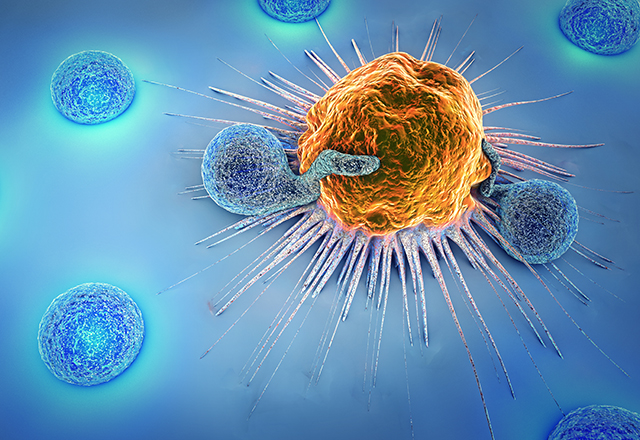The development and commercialization of cancer immunotherapies, a class of treatments that fights cancer by fortifying the immune system, has advanced at a rapid pace. Prior to 2017, most cancer immunotherapies were composed of antibodies that selectively flag cancer cells for destruction by other cells in the immune system. In mid-2017, the FDA approved Kymriah and Yescarta, the first immunotherapies that involve the direct administration of genetically modified immune cells called CAR-T. These cells are engineered to include a new gene for a specific protein (a chimeric antigen receptor, or CAR), which allows them to recognize and attack certain types of blood cancer. More than 75 percent of patients with no other curative treatment options went into remission following treatment with Kymriah or Yescarta in their respective phase II trials, demonstrating a strikingly robust clinical benefit. However, a sizeable proportion of patients displayed serious and sometimes life-threatening side effects as a result of the therapy itself.
A Double-Edged Sword
When a CAR-T cell encounters a target cancer cell, it releases factors that directly kill the tumor and, as a secondary measure, releases cytokines (signaling molecules) that stimulate the action of other immune cells in the vicinity. Both mechanisms are key to the ability of the CAR-T cell to fight cancer, but excess cytokine release led to a problematic state of hyperinflammation, referred to as cytokine release syndrome (CRS). In addition to posing a risk to patients, CRS presents a major barrier to the adoption of the treatment method by hospitals, due to the logistical challenges associated with appropriate management of this condition. This has led researchers to develop a new generation of CAR-T therapies that minimize CRS while providing just as robust benefits to patients.
Use It and Lose It Strategy
A research team at Cellectis, a French biotechnology company, has developed a CAR-T platform with built-in safeguards called CubiCAR. Their platform allows for the rapid depletion of CubiCAR cells by administration of the FDA-approved antibody rituximab. In vitro studies showed that the cells could be fully depleted after just 30 minutes in the presence of a low dose of rituximab — approximately 10-fold lower than the peak serum concentration reported in patients. As such, CubiCAR can be acutely shut down in the event that serious side effects occur.
Sliding Scale Strategy
A separate team of scientists at Calibr, a nonprofit drug discovery division of the Scripps Research Institute, has developed a switchable CAR-T (sCAR-T) that can be selectively “disarmed” by administration of a “switch” antibody, thereby preventing excessive CRS-associated inflammation. In a different approach, cells can be co-administered with the switch antibody to initially produce low-level effects and, by subsequently adjusting the dosage of switch antibody administration, the effect can be ramped up to a level that is appropriate for specific patients. Switch-mediated, dose-responsive increases and decreases in the rate of tumor clearance and serum-containing inflammatory factors were demonstrated by the research group in a lymphoma mouse model. The sCAR-T platform may offer a unique means by which physicians could tune the treatment up to increase efficacy or down to prevent adverse events. Calibr plans to enter this lead sCAR-T candidate into clinical studies for treating lymphoma starting in 2019.
Having shown antitumor effects comparable to FDA-approved CAR-T platforms in preclinical studies, the CubiCAR strategy developed at Cellectis and the sCAR-T strategy developed at Calibr offer clever and potentially clinically feasible solutions to a major limitation of this exciting technology. Furthermore, both strategies represent a class of “programmable therapies,” which can be controlled once inside the body to produce predictable and complex biological effects. While there is still a long road of validation ahead, they set important precedents for the techniques that can be employed in the management of cell-based treatments to combat different types of cancer.
References
- https://www.fda.gov/NewsEvents/Newsroom/PressAnnouncements/ucm574058.htm
- https://www.fda.gov/NewsEvents/Newsroom/PressAnnouncements/ucm581216.htm
- Valton, J., et.al., 2018. A Versatile Safeguard for Chimeric Antigen Receptor T-Cell Immunotherapies. Scientific reports, 8(1), p.8972.
- Rodgers, D.T., et. al., 2016. Switch-mediated activation and retargeting of CAR-T cells for B-cell malignancies. Proc of the Nat Academy of Sciences, 113(4), pp.E459-E468.
